https://www.dundee.ac.uk/corporate-information/founders-project-final-report
https://www.dundee.ac.uk/stories/university-dundee-publishes-report-slavery-links
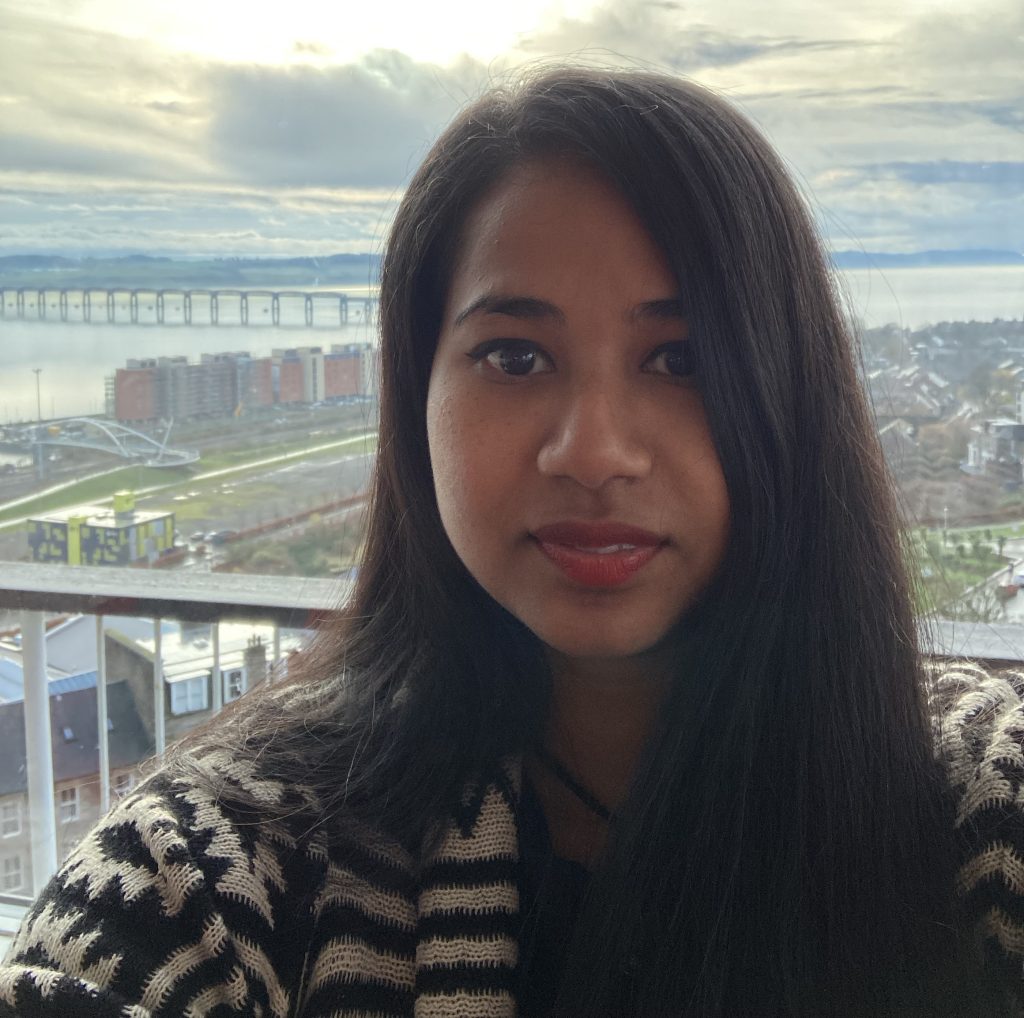
We are delighted to welcome Dr Cassandra Gooptar to the University of Dundee.
Cassandra takes up the post of Post-Doctoral Researcher on the University of Dundee Founders Project.
The post aims to discover more about the University of Dundee founding bequests and donations.
This will be achieved through archival and historical research into the provenance of bequests and donations to University of Dundee and affiliate institutions and their associations with slavery and empire.
Cassandra is also committed to engaging with the various multicultural Dundee communities associated to her findings.
Graham Fagen. The Slave’s Lament, 2015 Four-channel colour video installation, with sound, 14 min. 27 sec.
Now on display as part of the landmark exhibition spanning 110 years titled New Arrivals: From Salvador Dalí to Jenny Saville 27 November 2021 – spring 2023 at the Scottish National Gallery of Modern Art (Modern One) 75 Belford Road, Edinburgh, EH4 3DR
Ghetto Priest and the Scottish Ensemble perform The Slave’s Lament, composed by Sally Beamish, produced by Adrian Sherwood with additional guitars by Skip “Little Axe” McDonald and drums by Lincoln “Style” Scott.
A song credited to Robert Burns and first published in James Johnson’s Scots Musical Museum in 1792.
Made for Scotland + Venice 2015, curated by Hospitalfield.
The work was kindly gifted to the National Galleries of Scotland by Outset UK.
History is not the past, history is the present.
Black Atlantic Research Dundee (BARD) was established in 2019 to facilitate collaboration between a range of interdisciplinary scholars, artists, community organisations, and residents who are researching, supporting, and striving for positive change in relation to our understandings of empire, the Black Atlantic and the legacies of anti-Black racism and inequality today.
As a group of interdisciplinary scholars and artists who are actively involved in challenging stereotypical representations of race, gender, sexuality, and national identities we are appalled and outraged by the recent extrajudicial killings of George Floyd and Breonna Taylor in the US. We can link the origins of state-sanctioned racialised violence to 500 years of colonisation, slavery, imperial expansion, and genocide in the Americas. We also recognise that contemporary instances of violence such as these are not isolated incidents, and not limited to the US; they are part of wider institutionalised racism and discriminatory practices, engendered by white privilege and white supremacy found globally, including the more local setting of Scotland and the wider UK.
Slavery exists as part of the modern world—its legacies are found in economic and educational inequalities, immigration policies, city centre monuments, health disparities, discriminatory language—it encompasses histories and geographies that are not simply “over there” or “back then.” To understand and change the enduring legacies of empire and slavery it is imperative that we learn, educate, collaborate and act on anti-racist scholarship. This education involves directly and critically engaging with what slavery encompasses, in the past, present and future.
Racism is not passive: it is active, adaptable and requires ongoing challenges. If structural racism exists, then we must assert an anti-racist stance and continue to fight it. This is a time for us to reflect on what we do and what more we can do.
In 2019, we called on University of Dundee to explore the origins of the university in relation to imperial wealth. We reiterate that call today as a necessary first step in transparency.
BARD is open for strategic conversation and we encourage suggestions for future activities. We are keen to hear from local, national and international individuals and organizations who share our collaborative aims.
Links
Black Lives Matter USA https://blacklivesmatter.com/
BLM UK fund for donations https://www.gofundme.com/f/ukblm-fund
BLM UK twitter @ukblm
Scotland
Justice for ShekuBayoh https://www.crowdjustice.com/case/justiceforsheku/
Black Lives Matter Dundee https://www.facebook.com/events/s/black-lives-matter-dundee/258065158737248/?ti=as
Coalition for Racial Equality and Rights in Scotland https://www.crer.scot/single-post/2020/06/10/We-need-immediate-action-for-racial-equality-in-Scotland
Links to further resources
The University of Warwick History has produced an excellent academic reading list organised by theme:
https://rl.talis.com/3/warwick/lists/F7A958CC-FAAC-2918-63D2-5B8626BD0466.html
White academia do better: https://medium.com/the-faculty/white–academia-do-better-fa96cede1fc5
Positive Action in Housing ‘How to be an anti-racist ally after George Floyd’ https://www.paih.org/switch-off-the-hate-how-to-be-an-anti-racist-ally-after-george-floyd/?preview=true&_thumbnail_id=5613&fbclid=IwAR1ObvXjrZbnegNDz7Ft3ZP6AkkoXdMCuuXkeMtc6BKD70S_S-DagYFW2-g
Visit Black History website interviews curator Elizabeth Abston as well as Graham Fagen and Ghetto Priest about Fagen’s art work The Slave’s Lament which is currently on display as part of New Symphony of Time at the Mississippi Museum of Art.
https://visitblackhistory.com/reimagining-the-narrative-black-voices/

Scotland’s Black History Month 2019 arrived in style on 24 September with a joyous launch party at the Scottish Parliament in Edinburgh. Our own Dr Peggy Brunache was the Master of Ceremonies for this historic event.
The launch featured speeches by Prof Sir Geoff Palmer, Sandra Deslandes-Clark and a keynote by First Minister Nicola Sturgeon.
The evening will be remembered for performances both moving and uplifting from such as the Maryhill Integration Network Choir, Andrea Baker’s stunning vocals from Sing Sistah Sing! and a mesmerising poetry reading from Hannah Lavery’s The Drift.
Black History Month has been co-ordinated by CRER Coalition for Racial Equality and Rights in Scotland each October since 2001. The programme for this year’s events can be found here:
https://www.crer.scot/black-history-month


Scots-Barbadian artist Alberta Whittle has a stunning exhibition at the DCA Dundee Centre for Contemporary Arts from 14 Sep- 24 November 2019.
How Flexible Can We Make the Mouth refers to Whittle’s current preoccupation with healing, writing, breath and orality. Writing has always been an integral part of her practice and the texts she produces are meant to be read aloud, to be heard as well as seen. She also works rhythmically in relation to writing and reading, particularly looking at punctuation marks as visual signifiers of shifts in breath and breathing. Looking at the relationship between historical written testimonies and ancestral knowledge shared through oral traditions, the artist will be using video and performance to create direct encounters with audiences, encouraging mutual empathy, learning, and understanding.
https://www.dca.org.uk/whats-on/event/alberta-whittle
Peggy Brunache, Graham Fagen, and Michael Morris were invited to attend the historic signing of the Memorandum of Understanding between University of the West Indies and the University of Glasgow on 21 August 2019.
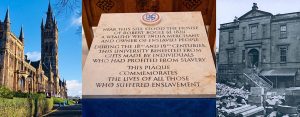
The Memorandum launches a program of ‘reparative justice’ including the founding of a new Glasgow- Caribbean research centre and the unveiling of a plaque acknowledging Robert Bogle of Gilmorehill as an enslaver and honouring those who ‘suffered enslavement’.
This follows a report written by Dr Stephen Mullen and Prof Simon Newman into the slave origins of some of the wealth donated to the university. The Report can be found here .
Prof Sir Hilary Beckles, Vice Chancellor of UWI and Chairman of Caricom Reparations Commission, spoke movingly about relevance of the Haitian revolution which Slavery Remembrance Day commemorates each 21 August. Finally, the Makar Jackie Kay read a new poem for the occasion.
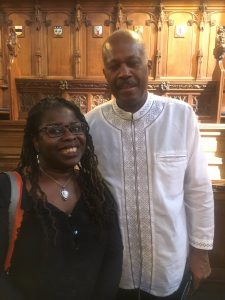
On 6 August 2019, Michael Morris co-organised a workshop with Emma Bond (St Andrews) at the V&A Dundee as part of the Transnational Scotland Project.

Purpose:
As a new design museum, V&A Dundee must continue to work hard to ensure the content of its Scottish Design Galleries reflects current scholarship on the systems of exploitation and empire that underpin Scotland’s successful design heritage. This workshop will critique the Scottish Design Galleries (the first to attempt to tell the story of Scottish design) and will explore how the museum can improve in its ambition to tell the transnational history of Scotland.
The aim of the workshop is to deepen the museum’s understanding of Scottish design within the context of post-colonial studies, and to help re-frame the content of the galleries by identifying alternative narratives that might challenge or complicate this story, and developing a more inclusive interpretative framework for the objects on display. The workshop will propose new objects for inclusion in the future and will consider ideas for new commissions or research projects. Objects or themes within the galleries that will form the basis for discussion will include: shipping and the maritime trade; slavery; Scotland and Asia; Turkey Red fabrics; jute; and Paisley shawls.
Victoria Adukwei Bulley and Hannah Young in conversation
The day featured a packed lunchtime public talk in the Auditorium with Dr Hannah Young and Victoria Adukwei Bulley. They discussed their collaboration on ‘Unfortunate Inheritances: Slave-ownership and the V&A’
Speakers:
Michael Morris (University of Dundee) and Lisa Williams (Edinburgh Caribbean
Association): Scotland and Slavery
• Prof Chris Whatley (University of Dundee): Jute
• Prof Bashabi Fraser (Edinburgh Napier University): East India Company
• Dr Rosie Spooner (University of Glasgow): Robert Weir Schultz and the Anglican Church in Khartoum
• Dr Suchitra Choudhury (Independent Scholar): Paisley shawls
• Dr Sally Tuckett (University of Glasgow): Turkey Red
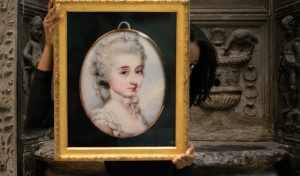
Scotland, the Caribbean and the Atlantic World panel
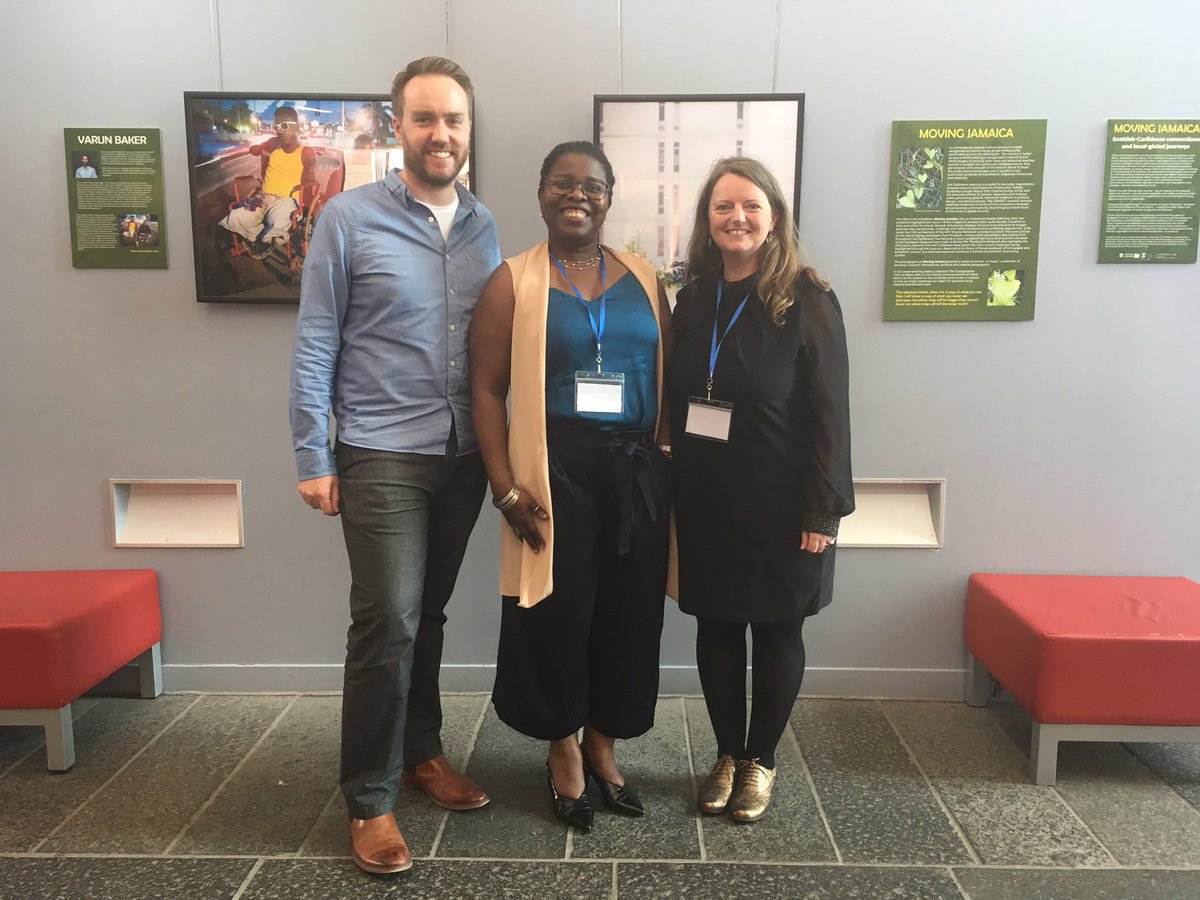
Left to Right- Michael Morris, Peggy Brunache and Susan Mains
We presented a panel on ‘Scotland, the Caribbean and the Atlantic World’ on 12 July 2019 at the Symbiosis Conference held at University of Dundee. Symbiosis is a Journal of Transatlantic literary and cultural relations.
Susan Mains curated an exhibition of Stephen McLaren and Varun Baker’s photographs in the foyer of the Dalhousie building.
The panel was a success with Peggy handing round pieces of sugar cane to demonstrate her analysis of foodways.
Panel: Scotland, the Caribbean and the Atlantic World
Susan Mains, ‘Caribbean-Scottish Connections: Conversing, Tracing and Representing Transatlantic Tidal Journeys’
Peggy Brunache, ‘Mainstreaming African Diasporic Foodways When Academia is Not Enough’
Michael Morris, ‘Robert Graham of Gartmore: empire, disavowal, reparation.’